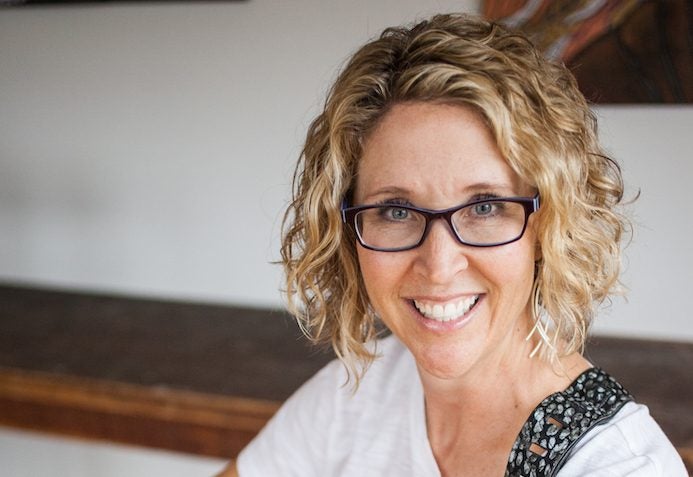Seeking Connection: Thoughts on school violence
Published 11:40 am Saturday, February 24, 2018

- Erin Smith is the owner of the OM place in Winchester, the author of “Sensible Wellness” and the online host of the OM channel. Follow her on Twitter @erinsmithauthor.
“If we are to reach real peace in the world, we shall have to begin with the children.”
~Mahatma Ghandi
By Erin Smith
Another week, another school shooting. I felt nauseous as I read about the tragic Parkland shooting last Thursday. I closed my eyes, sent a prayer to those parents who didn’t get to send their children off to school that day and hugged Izzie too tightly, tears on my cheeks. Then I called my college bestie, an elementary teacher in northern Kentucky.
“I’m sitting here running scenarios,” she said. “When the shooter shows up, do I run through the library, where we can barricade ourselves in, or do we jump out the window and make a run for the parking lot? I’ve talked to my class about this a lot. I told them not to be scared to run.”
She didn’t say if a shooter appears, but when. That this is her truth chills me to the bone.
How do we process the senselessness of mass shootings? Is it a gun reform issue? Yes, of course. A mental health issue? Again, yes. Should we blame deficient security measures? Violence in the media? A failing political system? Degrading race relations? Cyber-bullying? All these things play a part in the larger problem.
The issue of violence in schools is a complicated one and I’m not suggesting I have the answers. But I am also not interested in placing blame. I want to understand the root of the problem. Finger pointing only exacerbates the problem and stops each of us from taking personal responsibility for being part of the solution. When there is blame, open minds close, inquiry ceases, and the desire to truly understand diminishes.
Because here’s what I know for sure. We must try to understand violence if we are to intervene or change it.
Violence begins with disconnection. We are responsible for helping all of the children in our community become decent human beings; we need to teach them how to connect to themselves and each other. We do this by imparting to all kids they matter, they are loved and they are each a crucial thread in the fabric of our society. We should give them the tools to regulate their emotions and offer them opportunities to practice compassionate communication.
We should be ever vigilant in spotting the desperate, those marginalized kids who feel isolated and depressed. When identified, we can fold those disenfranchised into the larger group. We should identify those with chemical imbalances and get them the help they need.
We must include social and emotional learning (SEL) techniques in our school curricula. Schools play a powerful role in shaping our kids’ values. We know that mindfulness training improves feelings of empathy in students.
Clark County has taken a huge step in the right direction with the adoption of the BE Project this school year, an SEL curriculum that emphasizes mindfulness, compassionate communication, dealing with trauma and cultivating empathy. It shows students how to feel, rather than suppress, their feelings.
The curriculum teaches students how their brains work when stressed or angry, then gives them opportunities to notice those feelings in action and use deep, mindful breathing to stave off aggressive behavior. This shows them how to feel anger, sadness and loneliness in a curious, constructive way, while emphasizing these feelings are perfectly normal, impermanent and open to redirection.
If we want our kids to be kind, we’re obliged to teach them what kindness looks like, through modeling and offering opportunities to practice making the “best, right” decision. If we want our kids to feel included, we should actively encourage them to leave no one out.
If we want peace in the world, we need to teach our kids how to find peace in their own hearts and minds. We must teach children to be present in the moment.
Because mindfulness moves us from blame to accountability and personal accountability moves mountains.
I also called my friend Erin Royal, a licensed clinical psychologist, yoga teacher and mindfulness coach. She said, “There are many social, cognitive, behavioral, neuroscientific and religious theories about the reason for violence. Yet, it is important to keep in mind that we just don’t always know the why. The most important thing that we can teach our children is to process all pain in a way that fosters peace instead of violence.
“Sometimes the only way to contribute to world peace is to strengthen the peace within us as individuals. Be kind. Be inquisitive. Be humble. Speak up when something doesn’t feel right about a person or how a person is being treated. Believe there is good in the world and do what you can to be that good.”
Empathy and kindness are bipartisan values. Regardless of where we stand on the political issues, all humans basically desire the same things: to be safe, to be healthy, to be happy. SEL programs should no longer be an add-on for our children’s education. They are crucial if we want to prevent future school massacres.
Erin Smith is the owner of the OM place in Winchester, the author of “Sensible Wellness for Women” and the online host of a yoga and mindfulness channel for Eppic Films. Send her a shout out at erin@theOMplace.net or play along at www.theOMplaceChannel.com.





